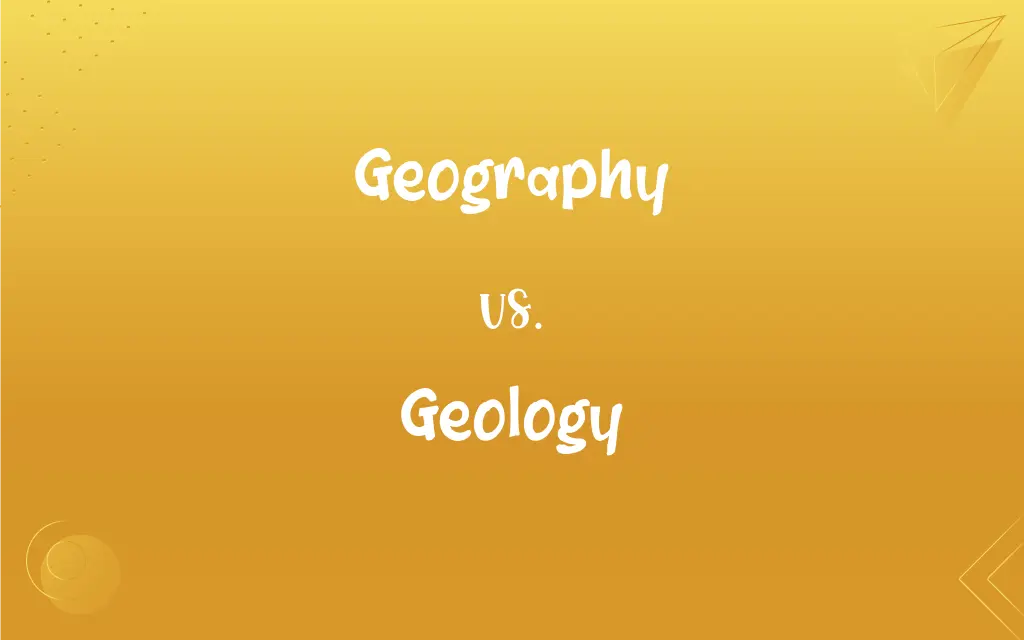Geography vs. Geology: What's the Difference?
Edited by Janet White || By Harlon Moss || Published on November 22, 2023
Geography studies the Earth's landscapes, environments, and places. Geology delves into the Earth's solid materials and their history.

Key Differences
Geography relates to the study of places, the relationships between people and their environments, and the physical and human phenomena on Earth. On the other hand, geology focuses on the study of the solid Earth and the processes by which it changes over time.
In geography, one might explore topics like climate patterns, urban development, and migration. Contrastingly, in geology, topics would revolve around mineralogy, tectonics, and the Earth’s internal processes.
Geography encompasses a broad spectrum, including both physical aspects like landforms and human aspects like cultures and economies. Conversely, geology zeroes in on the composition, structure, and history of the Earth's solid materials.
The tools of a geographer might include maps, spatial data, and satellite imagery, while a geologist might utilize rock samples, seismographs, and stratigraphic data.
To summarize, while both geography and geology pertain to the study of the Earth, the former is more diverse in scope, examining both physical and human landscapes, and the latter focuses primarily on the Earth's solid materials and their history.
ADVERTISEMENT
Comparison Chart
Focus
Study of Earth's landscapes and human-environment interaction.
Study of Earth's solid materials and their formation.
Scope
Both physical and human aspects.
Primarily physical aspects of the Earth.
Main Topics
Climate, urbanization, cultures.
Rock formations, tectonics, mineralogy.
Primary Tools
Maps, satellite imagery.
Rock samples, seismographs.
Associated Careers
Urban planner, cartographer.
Mineralogist, seismologist.
ADVERTISEMENT
Geography and Geology Definitions
Geography
The science that studies the Earth's physical features and the human societies spread across it.
Geography helps us understand the relationship between human cultures and their physical environments.
Geology
The science that deals with the Earth's physical structure and substance.
Geology offers insights into Earth's history through the study of rock formations.
Geography
The discipline analyzing how humans impact or are impacted by the Earth's surface.
Through geography, we learn how populations adapt to different climates.
Geology
A focus on the history of the Earth as recorded in rocks.
Through geology, we've discovered that dinosaurs roamed the Earth millions of years ago.
Geography
An examination of spatial characteristics and interactions.
The geography of a city can influence its economic development.
Geology
A study of minerals, rock layers, and the Earth's core.
The geology of the region indicated a rich deposit of gold.
Geography
The arrangement of particular features or phenomena on the Earth’s surface.
The geography of the region includes mountains and valleys.
Geology
The composition and internal processes of the Earth, including plate tectonics and erosion.
Geology reveals that earthquakes result from the movement of tectonic plates.
Geography
A depiction or representation, often in the form of a map, of a particular territory or area.
The geography of the atlas provides detailed information about each country.
Geology
The study of the materials of the Earth and the processes that shape it.
The Grand Canyon is a marvel for those interested in geology.
Geography
The study of the earth and its features and of the distribution of life on the earth, including human life and the effects of human activity.
Geology
The scientific study of the origin, history, and structure of the earth.
Geology
The structure of a specific region of the earth's crust.
FAQs
Is geology only about rocks?
No, geology studies the Earth's solid materials, their formation, and history, which includes rocks, minerals, and the Earth's processes.
What does geography encompass?
Geography studies the Earth's landscapes, human societies, and the interactions between them.
Can geography help in urban planning?
Yes, geography provides insights into landforms, human settlements, and environmental factors essential for urban planning.
What's a common tool used in geology?
Geologists often use rock samples and seismographs in their studies.
Does geography involve the study of cultures?
Yes, human geography specifically looks at cultures, economies, and societies in relation to their environment.
Is physical geography related to geology?
Yes, physical geography studies landforms, which overlaps with geology's focus on the Earth's physical structure.
Can geology help predict earthquakes?
Geology, especially seismology, aids in understanding and predicting earthquake patterns.
Why is geology important for natural resources?
Geology helps in identifying and extracting minerals, metals, and fossil fuels from the Earth.
What's the main difference between geography and geology?
Geography studies Earth's landscapes and human-environment interactions, while geology focuses on the Earth's solid materials and history.
Which professionals might study both geography and geology?
Environmental scientists and land-use planners might integrate knowledge from both fields.
How does geology contribute to building construction?
Geology helps determine the suitability of ground conditions and the availability of construction materials.
Do geologists study volcanoes?
Yes, volcanology is a subfield of geology focused on the study of volcanoes and volcanic processes.
How does geography influence economies?
Geography examines how location, resources, and accessibility can shape economic activities and trade.
Why do geologists often study fossils?
Fossils provide insights into Earth's history and the evolution of life.
Are there different types of geology?
Yes, geology has many subfields like mineralogy, petrology, and paleontology, each studying different aspects of the Earth.
How does geography influence climate?
Geography looks at how landforms and latitude affect local climates and weather patterns.
How does geography impact culture?
Geography studies how physical environments influence cultural practices, lifestyles, and societal development.
Can geology tell us about the Earth's past climate?
Yes, by studying rock layers and formations, geologists can infer past climatic conditions.
Can geography provide solutions to environmental issues?
Yes, geography can offer insights into sustainable land use, conservation, and human-environment dynamics.
What is a common method in human geography?
Human geographers often use spatial analysis and GIS (Geographic Information Systems) tools.
About Author
Written by
Harlon MossHarlon is a seasoned quality moderator and accomplished content writer for Difference Wiki. An alumnus of the prestigious University of California, he earned his degree in Computer Science. Leveraging his academic background, Harlon brings a meticulous and informed perspective to his work, ensuring content accuracy and excellence.
Edited by
Janet WhiteJanet White has been an esteemed writer and blogger for Difference Wiki. Holding a Master's degree in Science and Medical Journalism from the prestigious Boston University, she has consistently demonstrated her expertise and passion for her field. When she's not immersed in her work, Janet relishes her time exercising, delving into a good book, and cherishing moments with friends and family.







































































